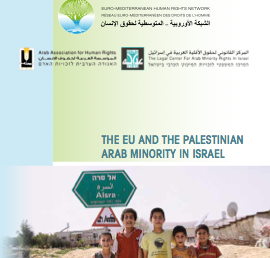UN Human Rights Council NGO Event: From the Galilee to Ferguson - Ending Police Violence Against Minorities
On 18 March 2015, Adalah in cooperation with Meezaan for Human Rights (Nazareth), the US Human Rights Network, the American Civil Liberties Union (ACLU) and the International Federation for Human Rights (FIDH), convened an NGO parallel event at the UN Human Rights Council (HRC) entitled “From the Galilee to Ferguson: The Emerging Global Movement to End Police Violence Against Minorities.”
Building on growing transnational efforts to link social justice struggles and highlighting parallels of oppression against minorities and marginalized communities around the world, the event brought together impacted persons from Israel/Palestine and the United States along with lawyers and human rights advocates to urge the international community to take effective steps to address police violence and state impunity.
This event followed two presentations at the HRC by the UN Special Rapporteur on Minority Issues Rita Izsák concerning a thematic report on hate speech and incitement to hatred against minorities in the media, as well as a series of recommendations by the Forum on Minority Issues on preventing and addressing violence and atrocity crimes targeted against minorities.
Israeli Police Violence against Palestinian Citizens of Israel
The event opened with a testimony from Rafat Amara, father of 22-year old Kheir el-Din Hamdan Amara, who was killed by Israeli police on 8 November 2014. (Read Adalah’s statement following Hamdan’s killing and a joint letter to the Israeli Attorney General with Mossawa and Meezaan) Mr. Amara described recounted the circumstances of his son’s death, and the impact of the killing on his family. Meezaan premiered clips of a new film that details the incident, including CCTV footage that captured the moment that Hamdan was shot point-blank by police. (See complaint filed jointly by the Amara family, Adalah and Meezaan to the Special Rapporteurs on Minority Rights and Extrajudicial Executions). Meezaan Attorney Sohail Mahameed presented additional cases of Palestinian citizens of Israel, including Sami al-Ja’ar (22 years old) and Sami Ziadna (45 years old) who were killed by police in the Naqab/Negev in January 2015. (Read call for independent inquiry by Negev Co-Existence Forum for Civil Equality)
Adalah’s Media Director, Salah Mohsen, analyzed Israeli police violence as a general tactic of repression used against Palestinians in Israel and in the Occupied Palestinian Territory (OPT). Mohsen described the events of October 2000, in which 13 Palestinian citizens of Israel were killed and hundreds more were injured, and argued that police violence is a symptom of systematic discrimination and rampant and state-sanctioned racism against Palestinians. He also described the official Or Commission of Inquiry, which conducted hearings into the October 2000 events. However, despite its positive findings, the Attorney General decided to close all files, which resulted in no accountability for the killings. Mohsen highlighted the almost blanket impunity enjoyed by Israeli state actors who violate the rights of Palestinians, including the right to life.
Violent suppression of protests by the police in Ferguson
Ashley Yates, a UN delegate with the US Human Rights Network (USHRN) and an activist in the US, spoke about her experience leading protests in Ferguson, Missouri following the shooting death of 18-year old Michael Brown, an unarmed black teenager killed by white police officer Darren Wilson. Yates described in detail the level of police brutality faced by protesters who challenge the racism of police and the disproportionate killings of people of color. Yates emphasized the excessive use of force by police, including the use of tear gas, and recalled advice offered to Ferguson protestors by Palestinian activists via social media regarding how to protect oneself from violent police tactics.
Thenjiwe McHarris of the USHRN contextualized the police violence against people of color as stemming from institutionalized racism in the US that daily threatens the lives of individuals in minority and marginalized communities. McHarris listed the names of those killed by police since Ferguson and described a police system in America that treated people of color less as citizens and more as security threats with diminished constitutional and human rights. Additionally, McHarris explained how the killings of minorities by police are rarely investigated seriously and lead to a level impunity that all but ensures repetition.
Towards International Regulation of Use of Force by Police
Jennifer Turner of the ACLU represented the International Network of Civil Liberties Organization (INCLO), a coalition of 11 civil liberties organizations around the world who have joined together to address common concerns. Turner presented the work of INCLO, and particularly a recent report entitled “Take Back the Streets” which details instances of violent police suppression of protest and calls for robust international regulatory frameworks governing the use of “less-lethal” weapons. Describing situations of excessive police force in diverse national contexts, Turner called on the international community to effectively constrain the use of lethal force by security forces by ensuring that domestic practices and policies conform with international standards and comply with international human rights law.
Nadia Ben-Youssef of Adalah and Dr. Ahmad Amara moderated the event and discussed the need for transnational efforts to combat state violence and end impunity. The moderators highlighted the similarities of state violence, and discussed ways to work together to demand attention to the root cause of discrimination and inequality that stigmatizes and dehumanizes minority and marginalized communities.
In addition to convening this parallel event, Adalah representatives together with partners met with relevant UN Special Procedures, diplomatic missions and international human rights organizations to discuss next steps in joint advocacy.















